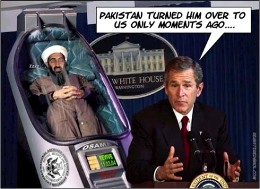 I have coffee most mornings at the local Starbucks.
I have coffee most mornings at the local Starbucks.
What the folks that I sit with have in common, mostly, is motorcycles.  But there’s a lot of political discussion goes on as well.
Most of these guys are a good deal more conservative than I am (I’m a liberal, if you didn’t know). Â Many of them are, in fact, distressed that Obama is about to assume the presidency of the U.S.
Sometimes, our conversations can get pretty heavy and heated. But, for the most part, people are respectful and receptive of each other’s points of view.  The operative principle seems to be, “If you give me a good listen, then I’ll listen to your lame theory too.”
One of the things I most like about such free-ranging discussions is that they can often cut to the heart of the matter rather than getting deeply tangled up in peripheral intellectual issues.
For instance, the other day, I got a long E-mail from a fellow who was attempting to dissect what had happened with the current economic melt-down and the banks and who fault it was. Â It went on at great length but then there was one sentence that cut through all the rest like a laser and, for me, it was the only thing of real value in the entire analysis. Â He said, “But ultimately, the villain is whoever was responsible for regulating the industry.”
We got to this point over coffee today.  We’re not brain surgeons and rocket scientists. We’re a nurseryman, a retired executive, an electric meter man, a real estate agent, a policeman and who ever else happens to drift by and decides to sit in.
The fear was expressed that with an Obama administration, we’d soon find ourselves with too much regulation and control in our lives.
On the other hand, I pointed out, it was the lack of regulation that been growing since the Reagan / Thatcher years that finally got us into this mess we’re in now where greed ran away with common sense (and our money).
One of my conservative friends replied, “Yes, but as soon as you have regulation, it begins to grow likes weeds and soon everything is overrun and stifled.”
I agreed – that did always seem to happen. But, the problem, thus far in history has been, that when it comes to regulation, we’ve always been in feast or famine mode; Either far too little or far too much. “How about some moderation?“, I suggested.
We know that wealth, new products, creativity and innovation spring from the promise of making profits.  This is what drives corporations, businesses and all forms of private enterprise.  It is, indeed, the goose that lays the Golden Eggs – so it is not in our best interest to regulate it into submission and tax it to death.
But, it does need some level of regulation.  Without regulation, the urge to seek profit will eventually always run us into difficulties just like it is now.  The trick is to apply just the minimum of regulation to prevent businesses from taking actions that are not in the long-term public good. But, beyond that, stay the hell out of their way.  “Yes, for example, we need wood products“, I said, “but woods products from renewable resources is one thing – cutting down our last forests is quite another.“ Without regulation, the profit seekers cannot make these discriminations.
A look around the table showed that this seemed like a reasonable idea.  “If it could be done.“, one said, “If you could keep those that like to add ‘just one more rule or regulation‘ at bay and if you could work out how to deflect every large multinational corporation who would love to ‘fiddle’ the rules and infiltrate the process for their own advantage.  Because the truth would be that even if you could get such a thing setup and running well, over time there would be endless forces around that would try to subvert it to their own aims; be they power or profit.”
The conversation turned then to what Obama might do once he’s in office. Even the most conservative of my coffee buddies now basically concedes that, with out some major October Surprise, Obama’s going to be our next president.
Someone said, “He’ll have a lot of power if the House and Senate also return Democratic majorities.” Â Someone else said, “No, he won’t. Â There are a lot of constraints on a president’s power that even the president himself doesn’t learn about until he gets into office and all the ‘secrets‘ are revealed to him and he finds out how things really work inside.”
This led to discussions of ‘Shadow Governments‘ and J. Edgar Hoover‘s vast powers over four or five presidencies and to why the Kennedys were assassinated. They were, perhaps, assassinated because they were too independent, had too much money and had snagged the highest offices in the land without being beholden to the real powers behind the throne in this country?  The Kennedys had tried to do an end-around on the real power brokers and were shown the door to eternity for their efforts.
The conversation continued to wander. It was suggested that both candidates are saying they will work to “Rebuild America“.
I scoffed.  “It’s too late.  Someone (with regulation) should have protected our manufacturing base and our hi-tech industries from the multinational corporations and the Globalization folks a long time ago.  They’ve already had their way with us.  In the search for bigger profits, they’ve shipped our manufacturing and hi-tech jobs overseas.  All of that was good for them and their shareholders and a lot of folks in the orient have also gotten wealthier as our American wealth has gushed over to them – but it hasn’t left us better off as a nation, an economy or as a people.”
I continued on the attack, “Everyone is worried that Obama is going to ‘distribute the wealth‘.  Get a grip folks – it’s already been distributed and it wasn’t by the socialistic programs of the Democrats. It was distributed by Globalization and multinationals drinking from the rivers of money flowing from the U.S. to the new hi-tech centers in India and the new manufacturing plants in China. The very rivers they helped setup for their own profits.  So, when folks talk, on either side, about rebuilding America, just what do they imagine they will rebuild it from?  Out manufacturing’s gone overseas, our hi-tech has gone overseas.  We’re just a cardboard store-front nation kiting checks that we call our National Debt and drowning here in cheap Wal-Mart plastic goods from China and hoping that they won’t send us any food with melamine in it.”
Well, comes the rejoinder, “It’ll only be worse under an Obama administration.  They’ll tax whatever incomes we still have and give it to the poor folks who didn’t have enough grit to get off their asses and go to work. I still say there will be too much regulation under Obama.  I drove my Suburban in for Coffee today – too much rain for the motorcycle. Soon I won’t be able to drive it without the police will stop me and say I’m illegal because I don’t have six people in it and I’m wasting precious gasoline.”
It was time to go to work, so we all got up to go off to our various destinations agreeing that it is all a major mess and that the politicians on all sides are lying about themselves and each other and they they aren’t going to be able to do even a tenth of all the stuff they are claiming they can do to fix it all.
And that’s today’s report from Starbucks – where the coffee is NOT Fair Trade Coffee – but, we won’t go there, eh?
Tags: McCain. Globalism, Multinational Corporations, Multinationals, Obama
Well said! Speaking of redistribution, don’t forget about our federal tax code! After all, it taketh and it giveth, all depending where on the spectrum you are and how many kids you have! Cheers – see you all at Starbucks!
Whatcha think of this Callahan essay?
“Is Fair Trade a Fair Deal?”
http://www.fee.org/Publications/the-Freeman/article.asp?aid=8244
Pookie,
Thanks for your comment and the link to the Callahan piece. I read Callahan’s piece and then I went and dug for a bit to see who the Foundation for Economic Education group was. Conservatives verging into Libertarianism is, I think, a fair description of their position in the political spectrum.
From my POV, Callahan’s analysis of why folks might want to help the coffee farmers and why the coffee farmers might need help leaves out a major possibility. But, given that he has Libertarian leanings, I’m not surprised. For a free-marketeer, the idea that free-markets can be unfair is anathema.
I give him credit though – he admits that there are some situations in which the market might not be fair – such as when some coffee farmers are given “some sort of state-granted privilege” and others are not.
But note that he lays the problem here back on the door step of government – as in “too much of” and “we don’t need it”. Surely, the battle cries of the Libertarian.
But, while he can see the possibility of the government trampling on the market and messing it up for the small farmer (how could a Libertarian not see something like that?), he amazingly hasn’t a word to say about what large multinational monopolistic corporations might do to that market. eh?
Think about what monoliths like Wal-Mart and Costco do to markets here in the U.S. They are so big (verging on monopolies due to being the gorilla in their marketplaces) that they can dictate what they will pay for product – and they often do.
Remember the United Fruit Company that operated in Latin America in the early to mid-20th century? They so monopolized the markets for fruit that either you sold to them at the price they would pay or you got out of dodge.
From a free-marketers POV, companies like this are sterling examples of what resourceful Capitalists are all about. Life is hard and they are the winners. But, from the other end of the view, they destroy choice and competition on the market in order to ‘own’ it and if you happen to be a small farmer on this end of the view, life is anything but fair.
So, back to our specific subject. Perhaps the market facing today’s small coffee farmers isn’t fair because (before the Fair Trade folks came along) those who were buying the coffee had such a monopoly that they were simply telling the farmers what they would pay for the coffee.
Hard to imagine? Consider that if you ‘own’ the market and you can control the price of coffee, then you will because it lowers costs and improves the return of the company’s shareholders. For free-marketers that’s all good sense and good business. Kind of a shame about the farmers – but, oh well. But for the monopolistic free marketeer, the smart thing to do is to lower the cost paid for coffee until the farmers are just barely able to survive. At that point, you have optimized. Capitalism 101.
So, perhaps the Fair Trade folks have seen this and decided to do an ‘end-run’ around the monopolists? We coffee drinkers up here in the U.S. are a pretty upscale bunch. We can afford to pay an extra nickle for a cup of coffee if it means that some poor farmer can make enough to get by as a result.
What’s the alternative? Should the Fair Trade folks instead go and pull on the corporate gorilla’s pant leg and say, “Please, can you be good and pay the poor farmers a fair price?” Yeah right. What free-marketeer worth his salt is going to lower profits out of a sense of guilt from misusing the monopoly he worked so hard to setup and milk in the first place?
Pookie, the reason I went and looked to see what philosophy Callahan and the Foundation for Economic Education espoused was because I thought I detected ideology when I read Callahan’s piece through the first time.
And by “Ideology”, I mean that the person or organization comes at a given problem with a preset notion of how to understand it and how to fix it. Remember the old saw that says “for a carpenter, every solution involves a hammer”?
Libertarians have preset notions and their notions blind them in part to what they are seeing. So, they can see government interference at 500 yards but they’ll miss a market monopoly unless their hair’s on fire.
I’d rather see an analysis of Fair Trade coffee from someone without an Ideological iron in the fire.